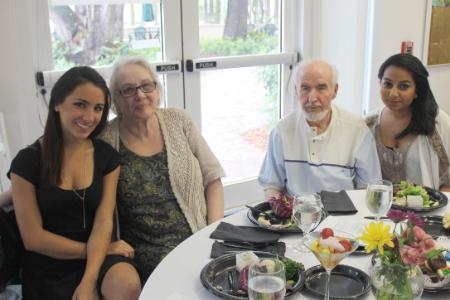In a recent study by the Pew Research Center, 73% of American Jews identified “remembering the history and lessons of the Holocaust” as an essential part of what it means to be Jewish.
A unique program at the University of Miami takes that remembrance to a personal level, by bringing together college students and Holocaust survivors for a unique learning opportunity.
 |
| HSSIP intern Kelly Rivera, her partner/survivor Ludmilla Lesley, Lesley’s husband Steven, and intern Farrah Mohammed |
The Holocaust Survivors Support Internship Program (HSSIP) is administered through UM’s Sue and Leonard Miller Center for Contemporary Judaic Studies and the George Feldenkreis Program in Judaic Studies in the UM College of Arts & Sciences, in partnership with Jewish Community Services of South Florida.
Professor Eugene Rothman, associate director for academic development and senior fellow at the Miller Center – who manages the HSSIP program – said, “The program creates wonderful relationships, where everyone gives and everyone receives.”
Holocaust survivor and Professor Emeritus of Engineering at UM Peter Tarjan said, “Four students have become my friends over the past year and a half” since he joined the program.
He noted what he has in common with each, including one of his interns who is studying engineering himself. Tarjan calls him as a “colleague” rather than a “student,” as his own teachers did in Budapest in 1954.
Intern Kimberly Garces now refers to books as the “‘cookie-cutter version’ of what took place during the Holocaust,” calling her partner Mala Dorfman “a strong and remarkable person who when faced with the utmost diversity continues to be the warm, caring and optimistic person I was so very lucky to meet.”
Both Garces and Dorfman are legally blind. “It is comforting to know that despite my vision, I can have a life like Ms. Mala,” Garces said.
HSSIP interns meet their survivors weekly for a full school year, and attend twice-monthly educational programs at the Miller Center under the supervision of Dr. Mindy Hersh, the program’s Director of Academic Enrichment. They are also required to take an academic course on the Holocaust during their internship period, and keep a detailed journal of all meetings with their survivor.
Since the program launched in 2003, more than 500 students and 200 Holocaust survivors have participated.
Many leaders of Miami’s Jewish community attended the 11th annual luncheon.
Greater Miami Jewish Federation President and CEO Jacob Solomon said, “I don’t think anybody survived the war, the camps, or the Nazis. They lived, but they were different people afterward.”
He added that the circumstances that led to the Holocaust still exist in 2015.
“We are not talking about history. We are talking about today,” he said.
Philanthropist Leslie Saiontz, daughter of Sue and Leonard Miller, called on the students in the program to continue the legacy of the HSSIP program by taking a stand against hatred and intolerance.
“Your generation needs to get it right. You need to continue to care and to continue to speak up,” she said. That message is universal, like the internship program that attracts UM students of every religion, race and ethnicity represented on campus.
April 29, 2015

